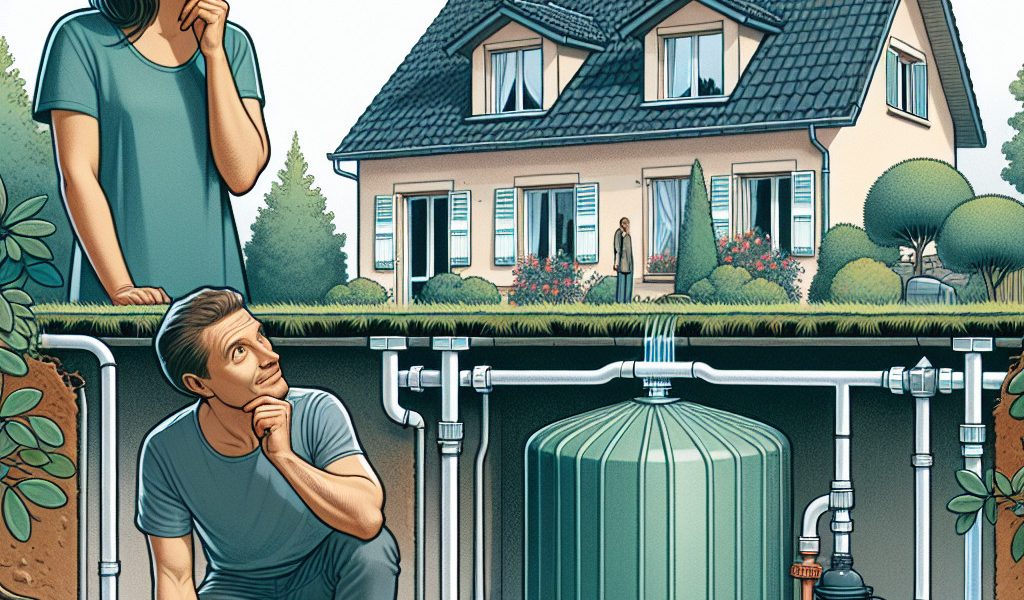Unlocking the Power of the Rain: A Guide to Individual Rainwater Harvesting in France
Introduction
Rainwater harvesting is an ecological and economical practice that is attracting more and more individuals in France. In particular, it allows this water to be used for gardening, domestic uses such as filling a swimming pool or powering a washing machine, while respecting certain precautions. In this article, we present to you the advantages and practical considerations linked to the installation of an underground rainwater tank, as well as the French legislation concerning the use of non-potable water in the domestic network.
The advantages of rainwater harvesting
- Reduction of waste: Rainwater harvesting allows us to save drinking water from the public network and thus reduce our ecological footprint.
- Financial savings: The free use of reclaimed water allows French individuals to save on their water bill.
- Pure water : The water collected is free of limescale and is therefore ideal for watering plants or powering certain household appliances (washing machines).
Possible use for various purposes
The collected water can be used for different purposes, including:
- Gardening: watering plants, lawns and vegetable gardens.
- Non-food domestic uses: filling a swimming pool, cleaning floors and windows, flushing toilets.
- The power supply of certain household appliances: washing machines (with appropriate treatment).
Potability of rainwater and necessary precautions
It is important to note that rainwater is not drinkable without specific treatment. In addition, French legislation prohibits the use of non-potable water for food and personal uses (drinking, cooking, showering). However, it is possible to use this water for certain domestic uses by taking a few precautions:
Adapted treatment
To use the water recovered in your home, you must install a suitable filtration system to eliminate the impurities present in this water. A fine particle filter can be used to power a washing machine, for example.
System separated from the public network
In order to avoid any health risk linked to the accidental mixing of drinking water and non-drinking water, it is obligatory in France to have a separate network for these two types of water. The tank must also be equipped with an anti-return device preventing any contamination of the public network.
Choose and install a rainwater tank to bury
To collect rainwater, it is necessary to install a storage tank. Underground tanks have several advantages:
- Aesthetic : They are hidden in the ground and do not clutter your garden.
- Frost protection: Buried, they do not fear low temperatures in winter.
- Optimized space: The space above the tank can be used for other developments (terrace, parking).
Suitable size and material
When choosing your rainwater tank to bury, take into account your water needs as well as the surface area of your roof. The larger it is, the more water you can collect. Regarding the materials of the tanks, we generally find models made of concrete or plastic (polyethylene). Concrete has the advantage of being sturdy and durable while plastic is lightweight and easy to install.
Best practices during installation
The installation of an underground rainwater tank must comply with certain standards to guarantee its proper functioning and durability:
- Check the minimum distance between the tank and the building foundations.
- Provide access for maintenance and cleaning of the tank.
- Ensure that the land is suitable for burial (absence of water table, stable soil).
French legislation concerning the use of non-potable water in the domestic network
In France, there are strict regulations regarding the use of non-potable water:
- The decree of August 21, 2008 relating to the recovery of rainwater requires in particular the establishment of a separate network for drinking and non-drinking water, as well as the installation of an anti-return device on the tank .
- Article R. 2224-19-5 of the General Code of Local Authorities specifies that food and body uses are prohibited with non-potable water.
To conclude, rainwater harvesting presents numerous ecological and economic advantages for individuals in France. However, certain precautions should be taken when treating and using this water as well as when purchasing and installing an underground rainwater tank. Do not hesitate to contact professionals to choose the system suited to your needs and comply with current standards.
